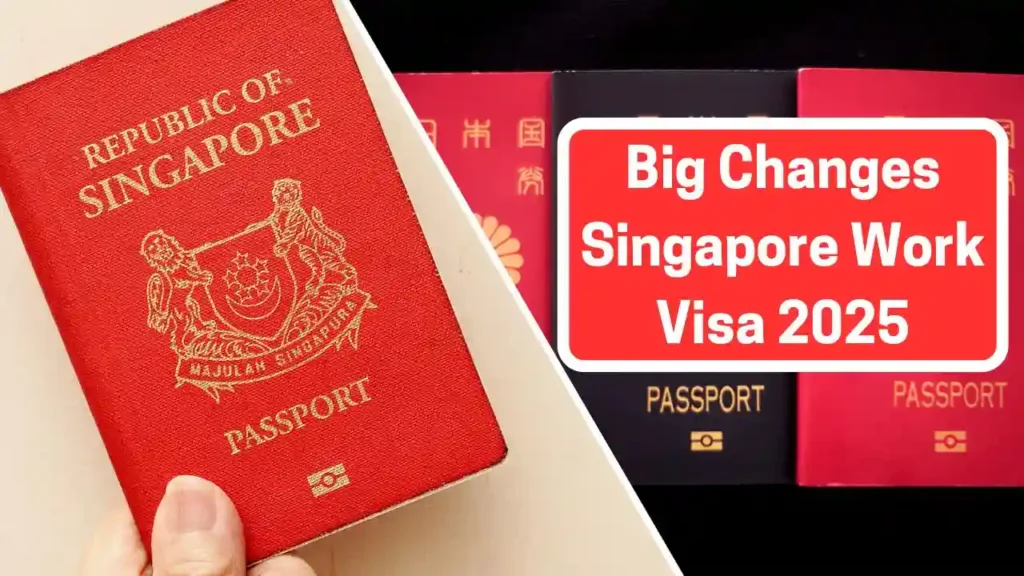Singapore’s work permit policies are undergoing significant changes in 2025, with new salary thresholds, levy rates, and stricter hiring guidelines for employers. These updates aim to ensure that businesses prioritize local talent while optimizing the foreign workforce. Both foreign workers and employers will need to adjust to these new regulations, which could lead to shifts in employment strategies across industries.
In this article, we break down the key updates in the Singapore work permit regulations for 2025, including salary adjustments, levy rate changes, and their impact on businesses and foreign workers.
What Are the Key Changes to the Singapore Work Permit in 2025?
Singapore’s Ministry of Manpower (MOM) has outlined significant changes to the work permit system for 2025, which will affect both employers and foreign workers. The new policies are designed to boost the skills of the local workforce while ensuring that businesses can still access necessary foreign labor. Let’s dive into the details of these changes.
Higher Salary Thresholds for S Pass Holders
The salary requirements for S Pass holders, particularly in the financial sector, will increase in two phases in 2025. This adjustment aligns wages with the upper one-third of local associate professionals and technicians and is aimed at attracting skilled foreign professionals.
New Salary Requirements for S Pass Holders (2025)
| Sector | Current Salary (SGD) | From Early 2025 (SGD) | From September 2025 (SGD) |
|---|---|---|---|
| Most Sectors | 3,000 | 3,150 | 3,300 |
| Financial Services | Higher than 3,000 | Higher than 3,150 | Even higher |
This phase-wise salary increase ensures that foreign professionals in Singapore are compensated at competitive rates, bringing them in line with local professional standards.
Increased Levy Rates for Employers
In addition to salary hikes, the levy rates for employers hiring S Pass holders will increase from September 2025. This change will lead to higher costs for businesses, making workforce planning even more critical.
Levy Rate Changes for S Pass Holders
| Levy Tier | Current Rate (SGD) | New Rate (From Sept 2025) |
|---|---|---|
| Tier 1 | 550 | 650 |
| Tier 2 | 650 | No Change |
Employers will need to assess their hiring strategies carefully to account for these increased costs. The increase in levy rates reflects the government’s aim to reduce reliance on low-wage foreign labor.
How Will These Changes Affect Employers?
With higher salary thresholds and increased levy rates, companies, particularly small and medium-sized enterprises (SMEs), will need to adapt their hiring and financial planning strategies. Some potential approaches include:
Adjusting Workforce Composition
- Automation: Businesses may invest in automation technologies to reduce dependency on foreign workers.
- Local Workforce Development: Employers will need to upskill local workers to meet labor market demands, thus reducing reliance on foreign labor.
- Optimizing Labor Costs: Companies will have to find ways to balance workforce distribution between local and foreign workers to maintain cost-effectiveness.
For SMEs that heavily depend on foreign workers, these updates could mean higher operational costs. Employers in these sectors should explore ways to become more efficient and cost-effective to offset these challenges.
Why is Singapore Implementing These Work Permit Changes?
The government’s primary goal with these changes is to strengthen the country’s labor market. These policies reflect Singapore’s long-term vision to build a highly skilled, competitive workforce. The objectives of the new regulations include:
- Prioritizing Local Talent: Encouraging businesses to focus on local hiring and workforce development.
- Attracting Skilled Foreign Workers: Offering higher salary thresholds to entice top foreign talent.
- Reducing Dependency on Low-Wage Foreign Labor: Creating a more sustainable labor market with a focus on skill-based employment.
These changes are part of Singapore’s broader strategy to meet its economic goals and maintain a competitive edge in the global market.
What Do These Changes Mean for Foreign Workers?
For foreign workers, especially those holding an S Pass, the updated work permit policies will have both positive and challenging implications:
- Better Earnings: The higher salary thresholds mean foreign workers can earn more in line with local industry standards, particularly those in high-demand sectors like finance.
- Increased Competition: With stricter job competition and increased hiring costs for employers, foreign workers will need to enhance their skills and qualifications to remain competitive.
- More Selective Hiring: Employers will be more selective in hiring foreign workers due to the higher costs associated with hiring and maintaining foreign labor.
How Can Foreign Workers Adapt?
Foreign professionals can take proactive steps to enhance their employability in Singapore:
- Skill Upgrading: Obtaining relevant certifications and enhancing qualifications can help workers stand out in a competitive job market.
- Target High-Demand Sectors: Focusing on industries with labor shortages can increase a worker’s chances of securing a position.
Frequently Asked Questions (FAQs)
What is the new S Pass salary requirement in 2025?
The salary requirement for S Pass holders will increase to SGD 3,150 from early 2025 and SGD 3,300 from September 2025. The financial services sector will see even higher thresholds.
Are levy rates increasing for all employers?
Yes, the levy rate for Tier 1 employers will increase from SGD 550 to SGD 650, while the Tier 2 levy rate will remain unchanged at SGD 650.
Will SMEs struggle with these changes?
Small and medium-sized enterprises that heavily depend on foreign labor may face challenges due to the rise in hiring costs. It will be important for SMEs to reassess their financial strategies.
How can foreign workers increase their chances of employment?
Foreign workers should focus on upgrading their skills, obtaining relevant certifications, and targeting industries with high demand for skilled labor.
How do these changes benefit local workers?
These updates prioritize local hiring, ensuring that Singaporean workers have access to more job opportunities and higher wages by reducing foreign labor reliance.
Will employers still hire foreign workers?
Yes, employers will still hire foreign workers, but they will be more selective and focus on highly skilled professionals who meet the new salary requirements.
Preparing for the Future of Work in Singapore
The Singapore Work Permit Updates 2025 reflect a shift towards a more competitive, skilled labor market. For employers, it will be essential to adjust hiring and financial strategies to align with the new regulations. For foreign workers, there are both opportunities and challenges ahead. By focusing on skill development and targeting high-demand sectors, foreign professionals can continue to thrive in Singapore’s evolving job market.



